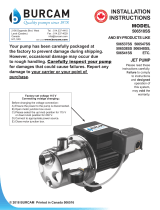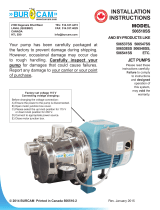
TROUBLESHOOTING - EFSUB SUBMERSIBLE PUMP continued
Problem Probable CauseCorrective Action
The pump starts too There are leaks in the system. Check all tank connections with soapsuds for air leaks.
frequently. Check plumbing for leaks. The system must be air and
water tight.
The pressure switch is defective. Check for a defective switch or switch out of adjustment.
Re-adjust or replace the pressure switch.
The tank’s pressure is not set properly. Pre-charged tanks; check tank pre- charge air pressure
and check for leak in the bladder. adjust air pressure
to 2 PSI (13.8 kPa) less than the pump cut-in pressure
(when there is no water pressure on system). Replace t
he bladder if necessary.
Air over water tanks: check for air leaks. Check Air
Volume Control (AVC). Check snifter valve operation.
Repair or replace tanks; replace snifter valves if necessary.
There is a leak in the drop pipe or check Raise the drop pipe one length at a time until water
valve stands in the pipe. Replace the pipe above that point.
The pressure switch is too far from the tank. Measure the distance from the pressure switch to the
tank. Move the switch to within 1 ft. of the tank.
Little or no water is The bleeder orifice check valve is stuck or Examine the valve. If stuck, free the valve; if installed
being delivered. installed backwards (standard tank only). backwards, reverse it.
The water level is low. Determine the lowest water level in the well while the
pump is running and compare to the pump depth
setting. Lower the pump further into the well (but at
least 5 ft. (1.6M) above the bottom of the well). Throttle
the pump discharge until the discharge equals the
recovery rate of the well. NOTICE: Running the pump
while airlocked can cause loss of prime and seriously
damage the pump.
The voltage is low. Check the voltage at the control box with the pump
running. Check incoming wire size and power supply
wire size against the tables in the Wiring section of
this manual. Install a larger wire from the meter to the
control box. Install a larger wire from the control box to
the pump.
If necessary, have the power company raise the
supply voltage.
The intake screen is plugged. Pull the pump and check the condition of the screen.
Clean or replace as necessary.
The valve at the pump discharge is stuck Pull the pump and examine the check valve. Free the
or blocked. check valve. Do not block the check valve with over
tightening pipe.
Impellers and diffusers are worn. Make sure the system is clear of obstructions and the
pump is in solid water and operating normally. Replace
the pump.
There is air or a milky There is gas in the well water. Check for the presence of gas in the well water.
water discharge coming Remove bleeder orifices; plug tees. Be sure plugged
from the faucet. tees do not leak. If necessary, separate gas from air
before it enters the pressure tank.
The air volume control is not working Make sure ports and ball check valves are clear. Replace
(standard tanks only). the control if necessary.



